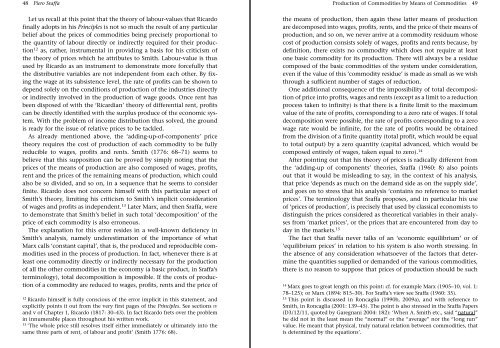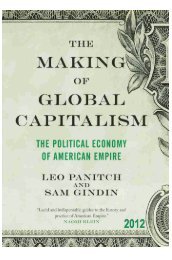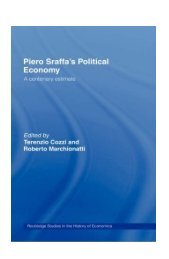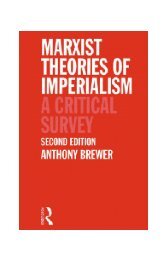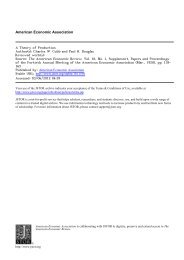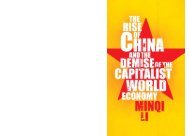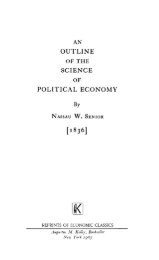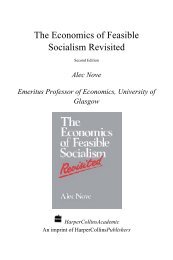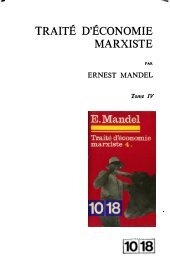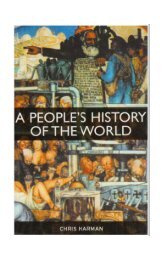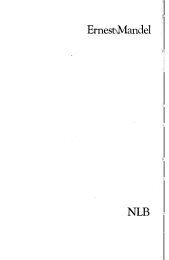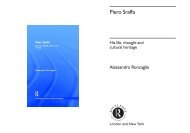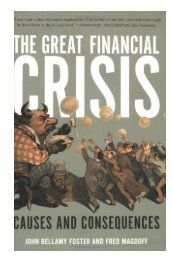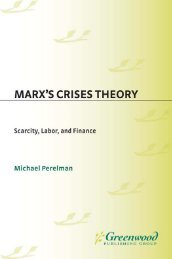48 <strong>Piero</strong> <strong>Sraffa</strong>Let us recall at this point that the theory of labour-values that Ricardofinally adopts in his Principles is not so much the result of any particularbelief about the prices of commodities being precisely proportional tothe quantity of labour directly or indirectly required for their production12 as, rather, instrumental in providing a basis for his criticism ofthe theory of prices which he attributes to Smith. Labour-value is thusused by Ricardo as an instrument to demonstrate more forcefully thatthe distributive variables are not independent from each other. By fixingthe wage at its subsistence level, the rate of profits can be shown todepend solely on the conditions of production of the industries directlyor indirectly involved in the production of wage goods. Once rent hasbeen disposed of with the ‘Ricardian’ theory of differential rent, profitscan be directly identified with the surplus produce of the economic system.With the problem of income distribution thus solved, the groundis ready for the issue of relative prices to be tackled.As already mentioned above, the ‘adding-up-of-components’ pricetheory requires the cost of production of each commodity to be fullyreducible to wages, profits and rents. Smith (1776: 68–71) seems tobelieve that this supposition can be proved by simply noting that theprices of the means of production are also composed of wages, profits,rent and the prices of the remaining means of production, which couldalso be so divided, and so on, in a sequence that he seems to considerfinite. Ricardo does not concern himself with this particular aspect ofSmith’s theory, limiting his criticism to Smith’s implicit considerationof wages and profits as independent. 13 Later Marx, and then <strong>Sraffa</strong>, wereto demonstrate that Smith’s belief in such total ‘decomposition’ of theprice of each commodity is also erroneous.The explanation for this error resides in a well-known deficiency inSmith’s analysis, namely underestimation of the importance of whatMarx calls ‘constant capital’, that is, the produced and reproducible commoditiesused in the process of production. In fact, whenever there is atleast one commodity directly or indirectly necessary for the productionof all the other commodities in the economy (a basic product, in <strong>Sraffa</strong>’sterminology), total decomposition is impossible. If the costs of productionof a commodity are reduced to wages, profits, rents and the price of12Ricardo himself is fully conscious of the error implicit in this statement, andexplicitly points it out from the very first pages of the Principles. See sections IVand v of Chapter 1, Ricardo (1817: 30–43). In fact Ricardo frets over the problemin innumerable places throughout his written work.13‘The whole price still resolves itself either immediately or ultimately into thesame three parts of rent, of labour and profit’ (Smith 1776: 68).Production of Commodities by Means of Commodities 49the means of production, then again these latter means of productionare decomposed into wages, profits, rents, and the price of their means ofproduction, and so on, we never arrive at a commodity residuum whosecost of production consists solely of wages, profits and rents because, bydefinition, there exists no commodity which does not require at leastone basic commodity for its production. There will always be a residuecomposed of the basic commodities of the system under consideration,even if the value of this ‘commodity residue’ is made as small as we wishthrough a sufficient number of stages of reduction.One additional consequence of the impossibility of total decompositionof price into profits, wages and rents (except as a limit to a reductionprocess taken to infinity) is that there is a finite limit to the maximumvalue of the rate of profits, corresponding to a zero rate of wages. If totaldecomposition were possible, the rate of profits corresponding to a zerowage rate would be infinite, for the rate of profits would be obtainedfrom the division of a finite quantity (total profit, which would be equalto total output) by a zero quantity (capital advanced, which would becomposed entirely of wages, taken equal to zero). 14After pointing out that his theory of prices is radically different fromthe ‘adding-up of components’ theories, <strong>Sraffa</strong> (1960: 8) also pointsout that it would be misleading to say, in the context of his analysis,that price ‘depends as much on the demand side as on the supply side’,and goes on to stress that his analysis ‘contains no reference to marketprices’. The terminology that <strong>Sraffa</strong> proposes, and in particular his useof ‘prices of production’, is precisely that used by classical economists todistinguish the prices considered as theoretical variables in their analysesfrom ‘market prices’, or the prices that are encountered from day today in the markets. 15The fact that <strong>Sraffa</strong> never talks of an ‘economic equilibrium’ or of‘equilibrium prices’ in relation to his system is also worth stressing. Inthe absence of any consideration whatsoever of the factors that determinethe quantities supplied or demanded of the various commodities,there is no reason to suppose that prices of production should be such14Marx goes to great length on this point: cf. for example Marx (1905–10, vol. 1:78–125); or Marx (1894: 815–30). For <strong>Sraffa</strong>’s view see <strong>Sraffa</strong> (1960: 35).15This point is discussed in Roncaglia (1990b, 2009a), and with reference toSmith, in Roncaglia (2001: 139–45). The point is also stressed in the <strong>Sraffa</strong> Papers(D3/12/11, quoted by Garegnani 2004: 182): ‘When A. Smith etc., said “natural”he did not in the least mean the “normal” or the “average” nor the “long run”value. He meant that physical, truly natural relation between commodities, thatis determined by the equations’.
50 <strong>Piero</strong> <strong>Sraffa</strong>as to equal the quantity demanded with the quantity supplied for anycommodity in the long period, or that market prices should fulfil thisfunction in the short (or very short) period. Indeed, the Classical (andSraffian) analysis does not involve a long–short period dichotomy; whatis involved is a dichotomy between actual and theoretical variables.Moreover, without any theoretical analysis of market prices, which areconsidered actual and not theoretical variables, the relation betweenmarket prices and prices of production must remain undetermined.Therefore, there is no textual evidence for attributing to <strong>Sraffa</strong> the ideathat prices of production are ‘centres of gravity’ for market prices. It is,then, incumbent to try to grasp the sense in which ‘prices of production’constitute a theoretical benchmark that increases our understandingof economic reality. Let us now consider this issue.It has already been repeatedly indicated that <strong>Sraffa</strong>’s point of view is inmany – though by no means all – respects similar to that of the classicaleconomists. They explicitly view the general framework for their analysisof relative prices and income distribution in a manner that can besummarised as follows. The determination of prices is studied at a givenmoment in time, given the prevailing technology. But technology can beconsidered as given only with reference to a given instant of time, as itis subject to ever-continuous evolution over time. Technology is alwaysreacting to changes rooted in past history (expansion of the market,growing division of labour), and going through a process of ceaselessrenovation. 16 In other words, the classical economists’ analysis of pricesexamines the situation of a given economic system at a given momentin time, much like a photograph of the system at an instant in time. 1716Torrens (1821) is even more explicit on this point. His position in this respectis discussed in Roncaglia (1972).17The metaphor of the ‘photograph’ (or ‘snapshot’, as my Italian was at first translated),originally proposed in my degree dissertation (Roncaglia 1969: 73), then inRoncaglia (1975: 119), is opposed both to the interpretations of <strong>Sraffa</strong>’s scheme asthe supply side of a general equilibrium model (cf. for instance Hahn 1982) and toGaregnani’s 1976b notion of ‘long period positions’, on which see § 8.5 later andRoncaglia (2009a). In a letter to Rüdinger Soltwedel of 28 February 1968 (<strong>Sraffa</strong>Papers, C 294/2, quoted by Bellofiore and Potier 1998: 64 as well as by Potier2000: 39 and Pasinetti 2007: 190) <strong>Sraffa</strong> himself utilises the term ‘photograph’in relation to his analysis. In an otherwise interesting article, Ginzburg (2000:126n), clearly unaware that <strong>Sraffa</strong> himself had used it, criticises the metaphor ofthe photograph – and through it my interpretation of <strong>Sraffa</strong>’s analysis – as implyingthe absence of any abstraction; there is however no implication of this kindin my interpretation, as the discussion of the assumption of ‘socially necessary’techniques in the following section shows; cf. also Roncaglia (1975: 27–9).Production of Commodities by Means of Commodities 51In this way, all the economic variables which are not the object of analysiscan be taken as given. Theoretical investigation can focus attention onthe ‘virtual’ movement of specific variables and on the relations betweenthese variables as if they were being considered ‘isolated in a vacuum’.In the case of Production of Commodities by Means of Commodities,the choice of the variables to be analysed falls on the relations thatexist between prices of production and the distributive variables, thewage rate and the rate of profits. Everything else (technology, levelsof production) is assumed to be given for the analysis of the particularproblem chosen.It must be pointed out, however, that this choice does not representan a priori refusal to analyse the problems of technological change,the determination of the levels of production or the policies of firms.Instead, it simply represents a decision to analyse each particular problemseparately, one at a time, isolated from the others. The assumptionsand the methods of analysis need not necessarily be the same for eachand every problem. It is necessary to choose, for each particular problem,only those variables most relevant to the analysis of the problemat hand, leaving aside those factors which, as Ricardo says, lead onlyto ‘modifications’ in the analysis, but not to changes in the substanceof the analysis. 18 Thus, in his analysis of production prices and theirrelationship with income distribution, <strong>Sraffa</strong> abstracts from technologicalchange, from movements in the levels of activity, from differencesin the market forms prevailing in each specific sector of the economy,from different kinds of labour, and so on. <strong>Sraffa</strong>’s prices of production,that is, represent in the simplest possible way the conditions of reproductionof a capitalist society based on the division of labour.3.4 Socially necessary techniquesLet us now turn to discussion of the possible existence of differenttechniques of production in use among the various productive unitsthat make up an industry. Does <strong>Sraffa</strong>’s analysis of prices of productionimplicitly refer to the most efficient (the most recent) among thetechniques in use, or to an average of the techniques employed in thevarious productive units within the industry? This problem is obviouslysignificant only if <strong>Sraffa</strong>’s analysis is intended as an attempt to describereal mechanisms or basic tendencies at work in market economies. If, on18We shall develop this point later on, in § 7.5, on the basis of a discussion of<strong>Sraffa</strong>’s relationship to Wittgenstein’s thought.
- Page 1 and 2: Piero SraffaAlessandro Roncaglia
- Page 3 and 4: ContentsList of FiguresIntroduction
- Page 5 and 6: Introduction ixWith this degree of
- Page 7 and 8: 2 Piero Sraffa(1874-1961), professo
- Page 9 and 10: 6 Piero Sraffarevaluation of the li
- Page 11 and 12: 10 Piero Sraffaadministration of th
- Page 13 and 14: 14 Piero Sraffa1.4 Imperfect compet
- Page 15: 18 Piero SraffaIn many fields of ec
- Page 18 and 19: 24 Piero SraffaAn Italian in Cambri
- Page 20 and 21: 28 Piero Sraffanot something fixed,
- Page 22 and 23: 32 Piero Sraffamonetary factors on
- Page 24 and 25: 36 Piero Sraffapartnered in his lab
- Page 26 and 27: 40 Piero SraffaActually, there was
- Page 28 and 29: 44 Piero Sraffadistribution of the
- Page 32 and 33: 52 Piero Sraffathe other hand, the
- Page 34 and 35: 56 Piero Sraffaof production. 24 Bu
- Page 36 and 37: 4Basic and Non-Basic Products4.1 Ba
- Page 38 and 39: 64 Piero SraffaA line of argument s
- Page 40 and 41: 68 Piero Sraffathe system stemming
- Page 42 and 43: 72 Piero Sraffaplan that would yiel
- Page 44 and 45: 76 Piero Sraffaproduced less quanti
- Page 46 and 47: 80 Piero Sraffaterms of labour comm
- Page 48 and 49: 84 Piero Sraffaof value is, and mus
- Page 50 and 51: 88 Piero Sraffabeing invariant to c
- Page 52 and 53: 92 Piero Sraffa(variable plus const
- Page 54 and 55: 96 Piero Sraffaconsumption goods),
- Page 56 and 57: 100 Piero Sraffadirectly required f
- Page 58 and 59: 104 Piero Sraffaproduction’ (iden
- Page 60 and 61: 108 Piero SraffaCritique of the Mar
- Page 62 and 63: 112 Piero SraffaThe growing remoten
- Page 64 and 65: 116 Piero Sraffareturns: Sraffa’s
- Page 66 and 67: 120 Piero SraffaFurthermore, the cl
- Page 68 and 69: 124 Piero SraffaIn this way the pro
- Page 70 and 71: 128 Piero SraffaSraffa raised again
- Page 72 and 73: 132 Piero Sraffaconnected, but can
- Page 74 and 75: 136 Piero SraffaThe bridge between
- Page 76 and 77: 140 Piero SraffaSraffa’s work for
- Page 78 and 79: 144 Piero SraffaThis debate is stil
- Page 80 and 81:
148 Piero SraffaObviously the ‘Ma
- Page 82 and 83:
152 Piero SraffaIn comparison to th
- Page 84 and 85:
156 Piero Sraffaof the path actuall
- Page 86 and 87:
160 Piero SraffaHowever, this const
- Page 88 and 89:
164 ReferencesReferences 165——
- Page 90 and 91:
168 ReferencesReferences 169Levhari
- Page 92 and 93:
172 ReferencesReferences 173——
- Page 94 and 95:
176 ReferencesReferences 177——
- Page 96:
180 IndexIndex 181Marx K., 10, 29,


